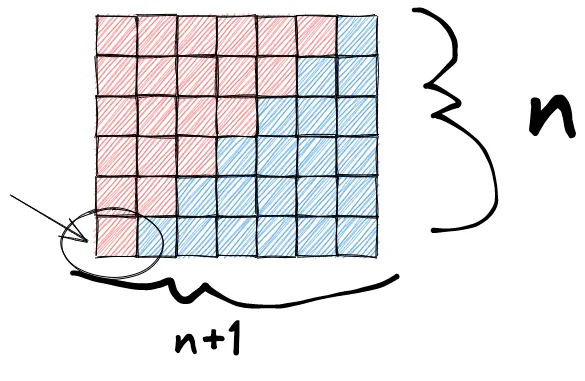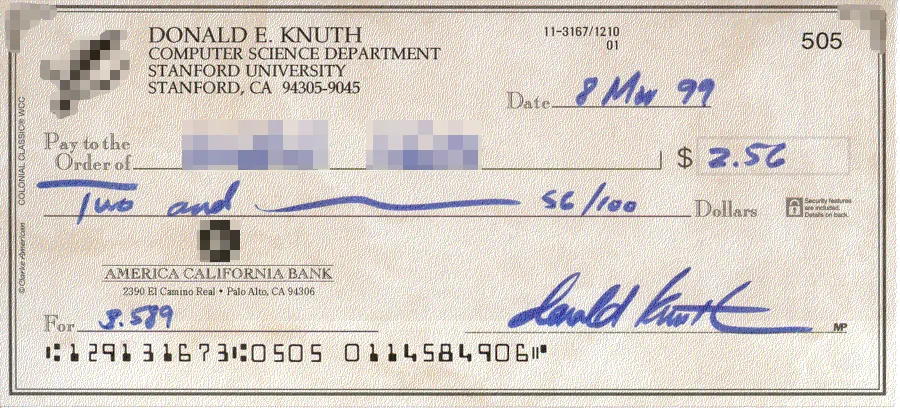Summary and Reflection 🤔
I’m continuing to work on the algorithms-boot-camp section of this site.
I’m working through a few courses now including Stanford’s algorithms course. See my notes on time-complexity
I’m going over some math in Volume 1 of The Art of Computer Programming by Donald Knuth. I included a funny anecdote about his approach to email, and how he stays focused on writing his book.
I also am interested in Werner Herzog’s new movie about consciousness and brain-computer interfaces called “Theatre of Thought’. Herzog is a fascinating person, and I wrote some notes on his unconventional approach to filmmaking here
Updates 🆕
integer-sum-formula

How do you find the sum of the numbers 1 through 100?
There’s a legend about the mathematician Carl Gauss coming up with the integer-sum-formula as a child in school. Supposedly the teacher asked the class to do a tedious assignment of adding numbers 1 through 100. Gauss could come up with the answer instantly, whereas the other students took 30 minutes to find the answer.
You can use the formula sum = n(n+1)/2 to find the sum of 1 to n numbers.
This is a good problem for studying math proofs because this equation has many different proofs and variations. I linked a video in the note that includes 12+ proofs.
For more, see my note on integer-sum-formula
Productivity Toolkit 🛠️
In this section, I’ll share a productivity tip I’ve learned recently.
We live in an age where we are constantly bombarded by messages and interruptions.
We are more connected and have more information than ever, but it’s almost impossible to do deep, focused work.
Interestingly, some of the most outstanding computer scientists, like Donald Knuth and Edsger W. Dijkstra, were cautious about certain technology trends like email.
On Email

Donald Knuth is a computer scientist who has been writing a book series called “The Art of Computer Programming” for over 50 years. The book is a comprehensive treatise on the subject of computer programming.
He has famously stayed focused on writing the book and carefully communicating with his fans.
Donald Knuth doesn’t have a personal email address. To reach him directly for questions or comments, you have to mail him a letter.
Here’s what he thinks about email:
I have been a happy man ever since January 1, 1990, when I no longer had an email address.
Email is a wonderful thing for people whose role in life is to be on top of things. But not for me; my role is to be on the bottom of things. What I do takes long hours of studying and uninterruptible concentration.
I need to communicate with thousands of people all over the world as I write my books. I also want to be responsive to the people who read those books and have questions or comments. My goal is to do this communication efficiently, in batch mode --- like, one day every six months
I DO NOT ANSWER UNSOLICITED EMAILS, nor do I respond to emails that were sent to my colleagues with a bothersome request for them to communicate with me. Email is a no-no EXCEPT for reporting errors in books.
I hope you can understand why I am almost always unhappy to receive unsolicited email myself. Thank you for your patience and cooperation as I try to finish The Art of Computer Programming (TAOCP), a work that I began in 1962 and that I will need many years to complete.
See Knuth’s post on email, for more.
Knuth Reward Checks

There is an email address for reporting errors in his books, but his secretary filters and prints the messages for him. The email address is strictly for reporting his book’s technical, typographical, or historical errors.
If you are the first to find an error, Donald Knuth will personally write you a check for $2.56 (a hexadecimal “dollar”). These checks are considered one of the most prized trophies in computer science.
For more info on Knuth Checks, see here.
Brain Food 🧠 Theater of Thought
In this section, I’ll share some interesting articles and “food for thought”
Werner Herzog is a german filmmaker who has produced, written, and directed more than sixty feature and documentary films. I appreciate his unconventional creativity and the sound of his voice.
Werner Herzog Rules for Filmmaking
He just released a new movie about consciousness and brain-computer interfaces called “Theatre of Thought.”
He interviews people working on technology that lets your brain communicate directly with computers. The Matrix is one of my favorite movies of all time, and I’m interested in this area of research. I’m excited to check out this film when it’s released. I still need help finding a place to watch it online.
Werner Herzog sets his sights on yet another mysterious landscape — the human brain — for clues as to why a hunk of tissue can produce profound thoughts and feelings while considering the philosophical, ethical, and social implications of fast-advancing neural technology.
I’ve taken some notes on Herzog’s creative approach to filmmaking here.
Outro
Check out the newsletter-roadmap to see what I have in mind for future issues. Get in touch with me on twitter @bsunter if you have any questions or comments!
